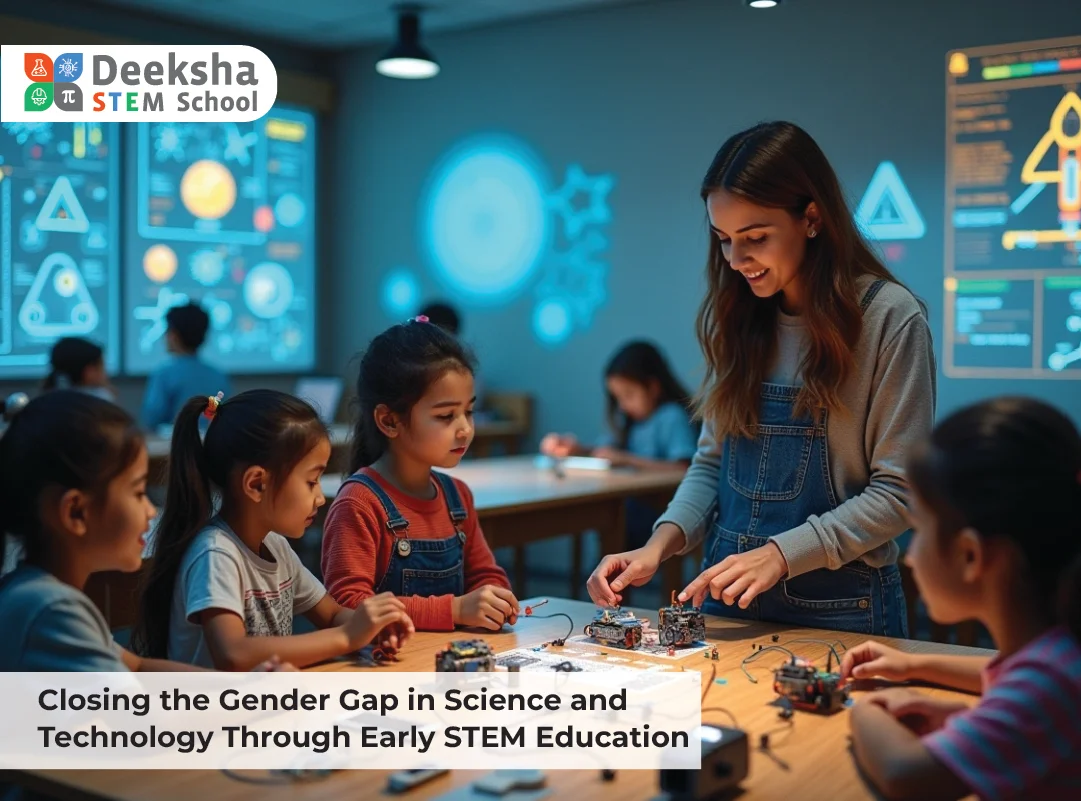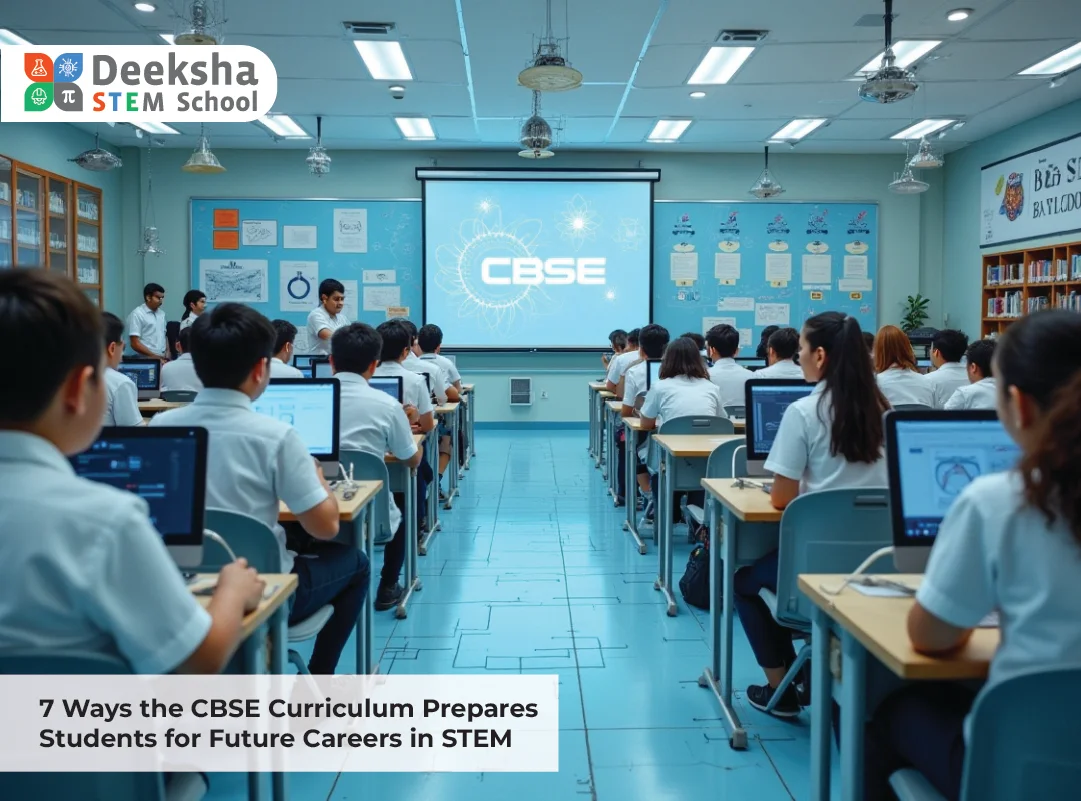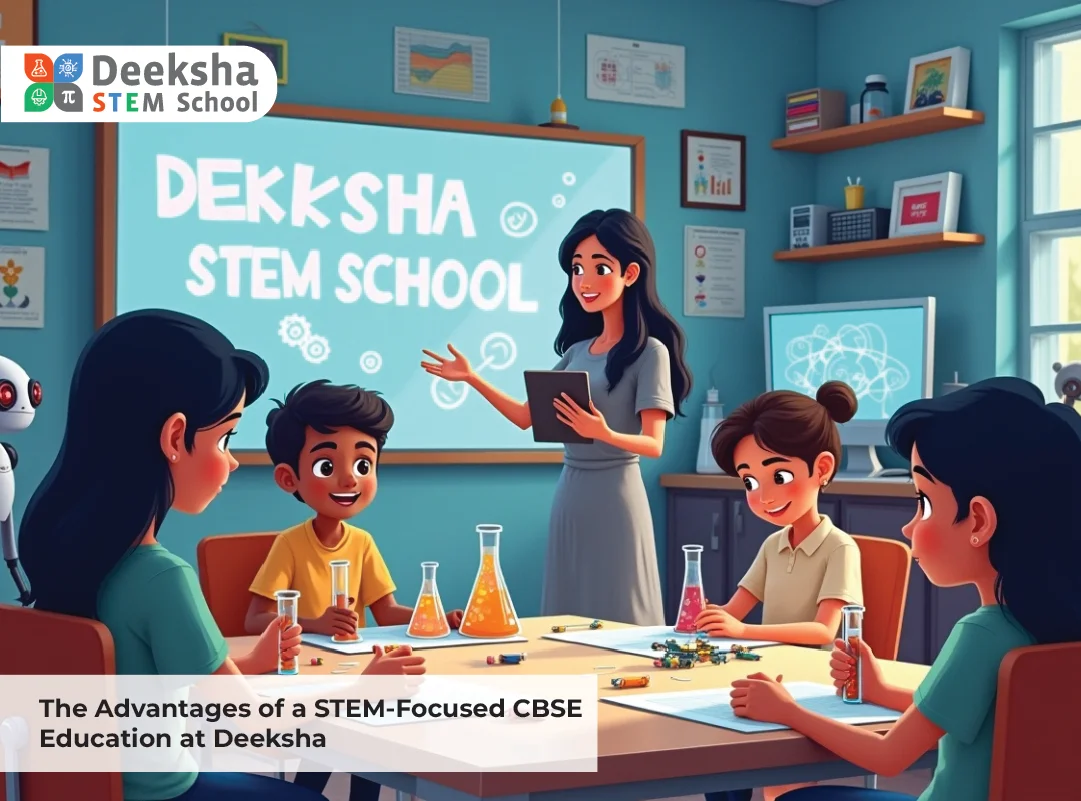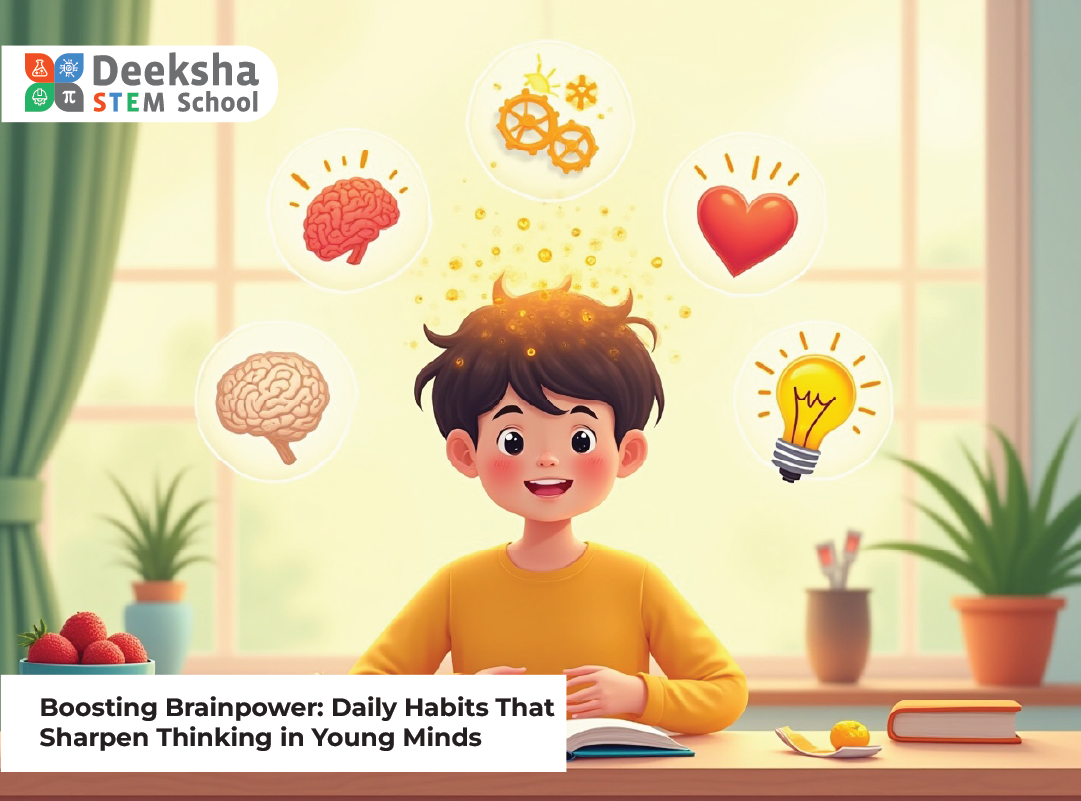Unlocking Your Child’s Potential: The Power of Learning Beyond the Classroom
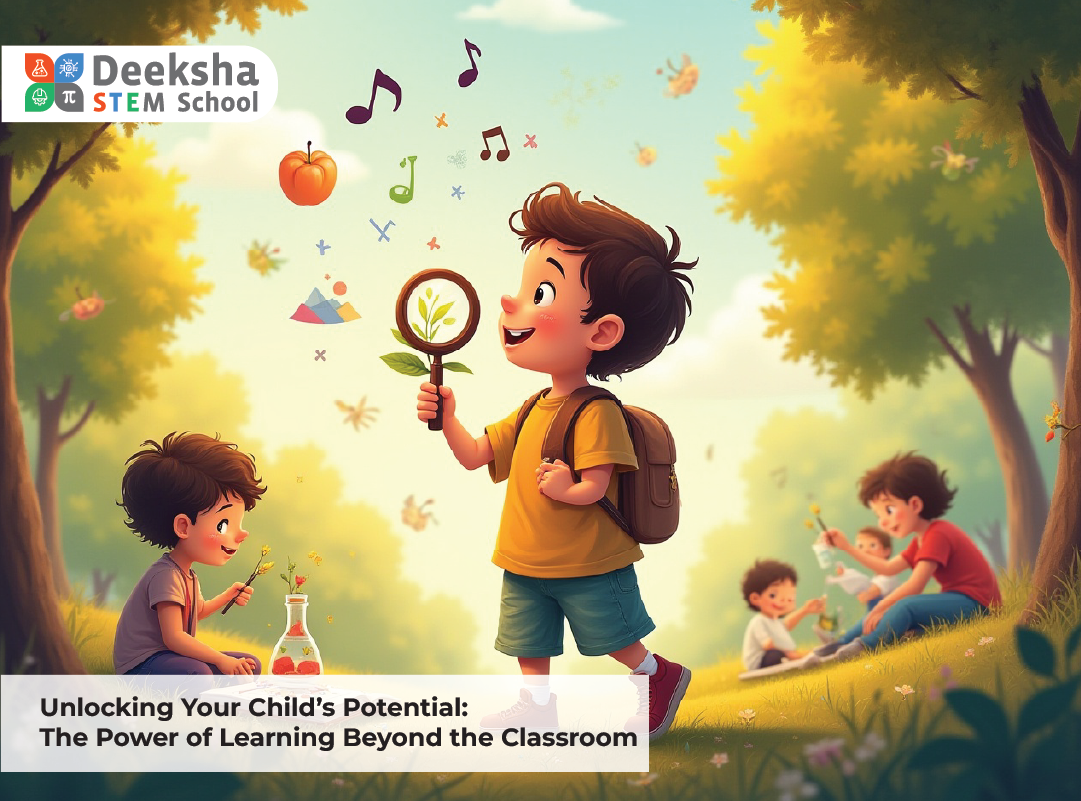
In today’s fast-paced and competitive world, education is no longer confined to textbooks and classrooms. To truly empower students, schools must offer learning experiences that go far beyond the syllabus. At Deeksha STEM Schools, we believe that real learning happens when students engage with the world around them — applying knowledge, asking questions, and exploring ideas through hands-on experiences.
Why Learning Outside the Classroom Matters
The Limits of Traditional Classroom Learning
While classroom instruction is essential, it often focuses on memorization, exam preparation, and rigid curriculums. This approach, while structured, may limit opportunities for students to develop soft skills, real-world awareness, and practical problem-solving abilities.
The Role of Experiential Learning in Child Development
Learning beyond the classroom encourages curiosity and fosters independence. It enables students to connect what they learn in books to everyday life. Activities like science fairs, group projects, nature excursions, and coding clubs create opportunities for critical thinking, collaboration, and creativity — essential traits for success in today’s world.
Types of Learning Opportunities Beyond the Classroom
Project-Based and Inquiry-Based Learning
These learning methods challenge students to solve real-world problems using their academic knowledge. For example, students might work in teams to build a sustainable model city or design a water filtration system — combining science, math, and innovation.
Field Trips, Nature Walks & Real-World Exposure
From visiting science museums to observing ecosystems during field trips, these experiences bring textbook concepts to life. They also help students understand cultural, social, and environmental issues from a practical perspective.
STEM Clubs, Competitions, and Maker Labs
Participating in STEM clubs or coding competitions sharpens technical skills and nurtures innovation. At Deeksha STEM, our maker labs are equipped to allow students to build working models, explore robotics, and prototype their own inventions — helping bridge theory and application.
Art, Music, and Physical Education as Learning Extensions
These areas are more than just extracurriculars. Creative pursuits like painting, theater, and music improve brain function, emotional well-being, and communication. Physical education, too, teaches discipline, leadership, and resilience — all important for holistic growth.
How Deeksha STEM Encourages Learning Beyond Textbooks
Interdisciplinary Approach with Hands-On Learning
At Deeksha STEM, our curriculum integrates academic subjects with real-world problem-solving. For example, a math lesson on geometry could be linked to an art project involving mandala patterns or architecture design challenges — enabling students to see connections across disciplines.
Student-Led Innovation Projects and Exhibitions
We encourage students to take ownership of their learning through annual exhibitions, hackathons, and STEM challenges. These platforms allow them to showcase original ideas, engage with feedback, and develop presentation skills — preparing them for future careers and higher education.
Collaborative Clubs and Activities
From eco-clubs to literary societies, Deeksha STEM Schools offer a wide range of co-curricular avenues. These encourage students to work as teams, plan events, and develop leadership — experiences that can’t be learned from textbooks alone.
Campus Environments That Stimulate Curiosity
Our campuses at Bannerghatta Road, Judicial Layout, Kengeri, and Vidyanagar are designed to stimulate exploration. Interactive classrooms, open science corners, and flexible maker spaces ensure students are always encouraged to tinker, explore, and discover.
Benefits of Learning Beyond the Classroom
Boosts Critical Thinking and Problem-Solving
Students exposed to experiential learning scenarios are better equipped to think critically and respond to challenges creatively. Instead of rote learning, they learn how to evaluate information and make decisions effectively.
Builds Communication and Teamwork Skills
Group projects, debates, and presentations improve interpersonal skills. Whether it’s speaking with confidence or resolving conflicts within teams, these abilities are essential for success in both academic and professional life.
Encourages Independent Learning and Confidence
By exploring topics of personal interest through clubs or self-directed research, students build confidence in their abilities. They also learn to set goals, manage time, and take responsibility for their growth.
Improves Academic Performance Holistically
Contrary to the myth that extracurricular activities distract from academics, multiple studies show that students involved in extended learning perform better in exams. This is because they develop a deeper understanding of concepts and retain them better.
How Parents Can Support Extended Learning
Create a Home Environment for Exploration
Keep books, art supplies, puzzles, and tools accessible at home. Encourage open-ended questions and allow your child to explore ideas without the fear of failure.
Encourage Curiosity Over Perfection
Celebrate effort, not just results. When children feel safe to try and fail, they’re more likely to take initiative and pursue their interests passionately.
Support Participation in School Clubs and Activities
Attend exhibitions, encourage competition participation, and engage with your child about what they’re doing at school. Active parental interest goes a long way in boosting motivation.
Engage with Teachers on Holistic Development
Speak regularly with teachers not just about grades but also about your child’s interests, skills, and behavioral development. A strong parent-school partnership ensures better outcomes for students.
Frequently Asked Questions
1. What does learning beyond the classroom mean?
- Learning beyond the classroom refers to educational activities and experiences that occur outside the traditional academic environment. This includes field trips, hands-on projects, clubs, arts, sports, and real-world problem-solving activities that enhance both cognitive and social-emotional skills.
2. How does Deeksha STEM support extracurricular learning?
- Deeksha STEM Schools provide a structured environment for extended learning through innovation labs, student-led clubs, competitions, interdisciplinary projects, and creative arts programs. Each campus is designed to promote exploration and practical learning.
3. Can extended learning improve academic scores?
- Yes, students who engage in meaningful co-curricular activities tend to perform better academically. These activities reinforce classroom concepts, build memory through application, and make learning more engaging and relevant.
4. Is it necessary for students of all age groups?
- Absolutely. Whether in primary school or secondary grades, learning beyond the classroom benefits all age groups. It helps younger students develop foundational skills and older students gain clarity about career interests and real-world readiness.
5. What kind of after-school activities are beneficial?
- STEM clubs, reading circles, art and craft sessions, music lessons, sports, coding workshops, and environmental initiatives are all highly beneficial. These activities should align with a child’s interests and provide opportunities for growth, expression, and learning.
Final Thoughts
At Deeksha STEM Schools, we believe education is not just about passing exams but about preparing students for life. Learning beyond the classroom gives children the space to experiment, collaborate, and discover who they are. With the right environment and guidance — both at home and at school — every child can unlock their full potential.
We invite parents to explore how our unique blend of academics and extended learning opportunities at Deeksha STEM campuses in Bannerghatta Road, Judicial Layout, Kengeri, and Vidyanagar is shaping future-ready learners.

